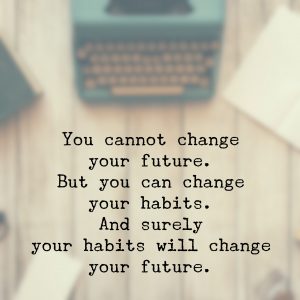There are no shortage of memes about goals.
“A goal without a plan is just a wish”
“Set your goals high, and don’t stop until you get there”
“Goals that are not written down are just wishes”
Aaaah! They’re endless!
Not only were goals a huge part of my early success with my weight, but they were a cornerstone of my health coaching business for a long time. I would teach folks about SMART Goals. How to create them, and help them through the process.
But I’ve changed my attitude about goals. I don’t think they’re necessary anymore.
I have a client who’s daughter is one of the most disciplined kids that I know. Every year, she’d create New Years Resolutions, and actually complete them! I Know! Who does that?!?
I think they were tests of her willpower. When she was in high-school, she created a New Years Resolution to perform 20 push-ups every day.
He reported that there were nights when she would get out of bed because she’d forgotten to perform her push-ups that day.
Wow!
But once the calendar would turn to January, she would abandon the previous year’s resolution, and focus on a new goal.
I think most folks look at New Year’s Resolutions a little differently. Most look at them as an accomplishment – and not that my client’s daughter didn’t, but I guess we want our lives to be in a better place in the coming year than when we set the resolution.
It got me thinking about goals.
I used to be a huge goal setter – and to some extent, I still am. I set goals for what I want to accomplish in my business in the next year or 6 months, and then set a path to go out & make that happen. My daily tasks all support the end goal.
If you’re really doing the goal setting thing right, first you create a long term goal – let’s say 3 months. Then second, you figure out a few interim goals, kind of like milestones that you can figure out if you’re on the right track. Thirdly, you then create tasks that you need to accomplish in order to support those goals.
Many folks, when creating New Years Resolutions only make it as far as the long term goal – which is why many resolutions fall off within the first few months. There’s no plan or support system behind them.
But I haven’t set goals with my health for a LONG time.
Because, well … I don’t know. After a while, I didn’t feel like I needed them.
The problem with goals
Most folks will say that being goal oriented is a good thing. And while I do agree that under some circumstances, goals are fantastic, when it comes to your health, I think that goal setting is the wrong path to take.
There’s no doubt about it. 90% of people who lose weight regain most or all of it back.
Why is that?
There are some theories. But given that it takes less effort to maintain a lower weight than it does to get to the lower weight, wouldn’t it make sense that folks would be able to make that shift?
It got me to thinking about goals, and what happens when we accomplish them?
We stop.
Right?
Okay – so, let’s say that it’s my goal is to lose 20 lbs. Once I achieve that goal, I stop doing what I was doing to lose.
Unless I immediately create another goal to maintain that weight for X amount of time, I’m playing it by ear, without a real plan.
Once we accomplish the goal, we want to celebrate the win. Right?
But. . . sometimes we just don’t have the energy to think about what happens next.
I’ve done all of this work to get to this point. And now it’s over.
But the thing about health is, it’s NEVER over.
This makes me think about the show the Biggest Loser. At the end of the show, there’s a HUGE celebration because someone has been the MOST successful of all the contestants. And after the confetti is swept up, we’re led to believe that the winner has succeeded. They now ride off into the sunset with their new body & fantastic new life.
But once you’ve lost all that weight, now you need to maintain that.
You’ve just started the journey!
Instead what the contestants do, is they go back to their old life with their old habits, and old environment that shaped their overweight selves in the first place.
It’s no doubt that most have regained all of their lost weight.
When we finish a goal, when we cross that finish line, we stop.
And that’s the problem with goals.
Once we stop, we don’t want to start again.
Starting again is difficult – mentally. It is! If you’ve ever taken a hiatus from a sport (running, exercising, cycling) resuming that activity is an exercise in mental strength.
Starting something is hard. Maintaining is easier.
It is SO MUCH easier to just keep going.
So, what do you do instead of goals?

THAT is why habits are so much more effective than setting goals.
With habits, there is no end. With habits, the mindset is that ‘This is the new normal until it doesn’t suit my life anymore.’
When you work on habits, you focus on one behavior, and ask, ‘How do I start doing this regularly?’ ‘How can I insert this behavior into my life so that it’s effortless?’
Now, I’m not going to lie. I’ve been exercising for almost 20 years, and it still takes effort. But I’ve inserted it into my life in such a way that I don’t really have to think about it.
But because I’m not exercising with the result being for a specific goal – a competition or a race – it’s just part of my daily routine. There’s no end. So, I don’t have to think about what to do when I get there.
What’s next?
If stopping and starting is derailing your health goals, you might be interested in Health Coaching or the Bye-Bye Belly Blueprint coaching programs. The Bye-Bye Belly Blueprint. Click HERE to learn more and Join the Waitlist!

Elizabeth is a Master Certified Life and Health Coach with over 18 years of experience, dedicated to helping women in midlife thrive through holistic health and wellness. Her personal journey began with a desire to reduce her own breast cancer risk, which evolved into a mission to guide women through the complexities of midlife health, from hormonal changes to mental clarity and emotional resilience.
Elizabeth holds certifications from prestigious institutions such as The Life Coach School, Precision Nutrition, and the American Council on Exercise, as well as specialized training in Feminist Coaching and Women’s Hormonal Health. Her approach is deeply empathetic, blending her extensive knowledge with real-life experience to empower women in their 50s and 60s to build sustainable health habits that last a lifetime.
Recognized as a top voice in women’s health, Elizabeth speaks regularly on stages, podcasts, and webinars, inspiring women to embrace midlife with energy, confidence, and joy. Her passion is helping women regain control of their health, so they can fully engage in the things that matter most to them—whether that’s pursuing new passions, maintaining strong relationships, or simply feeling great in their own skin.